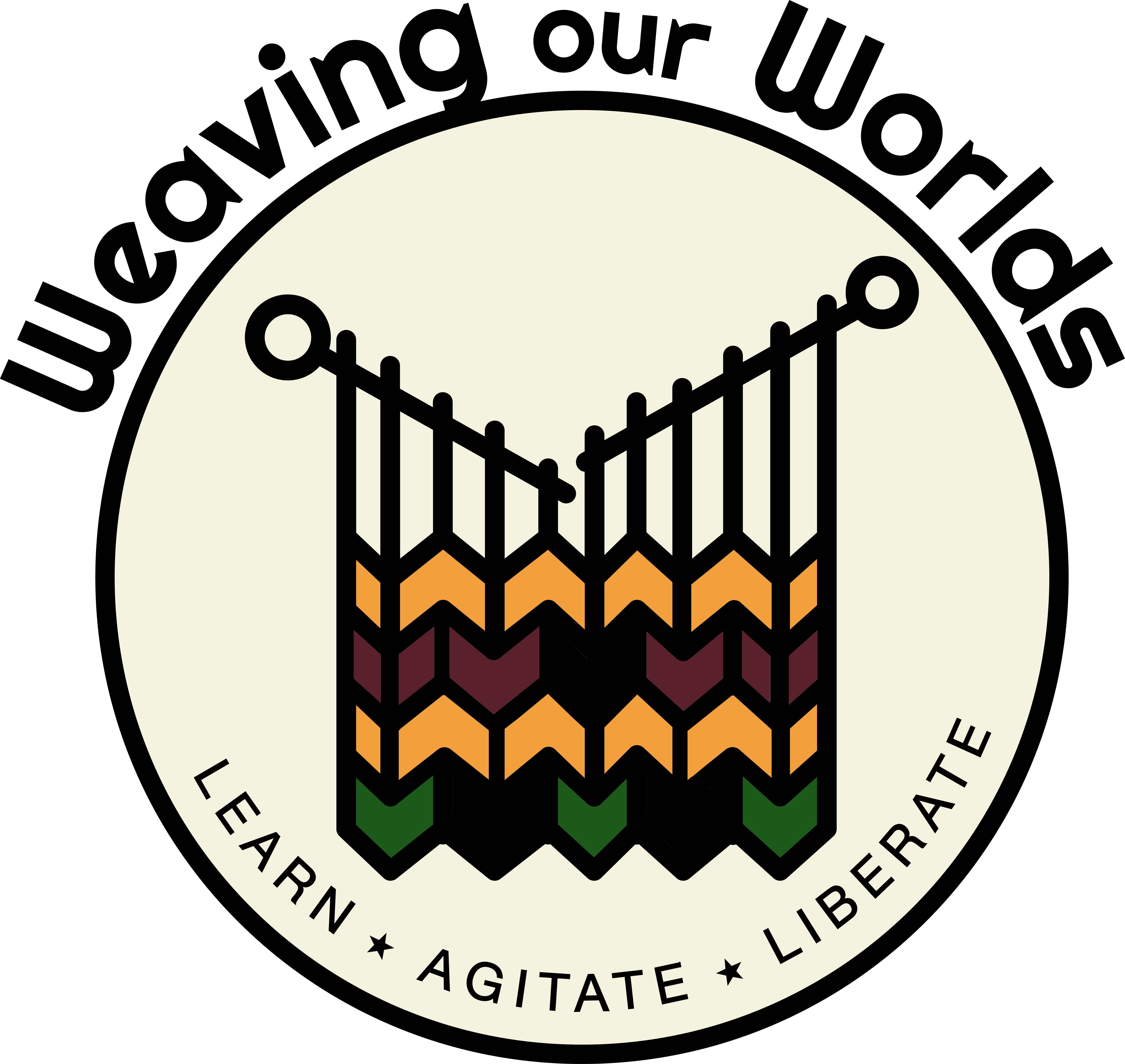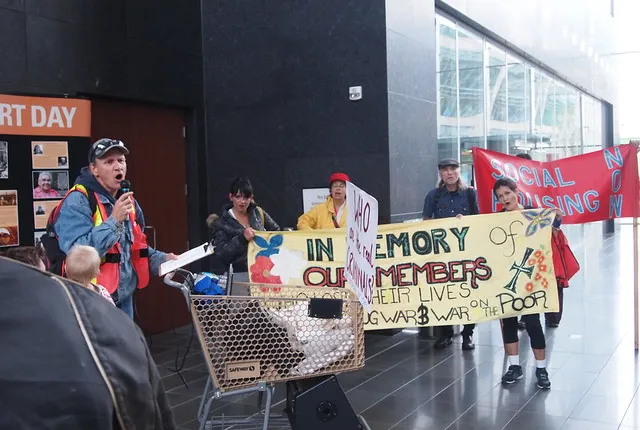Weaving our Worlds has monthly study in struggle conversations and this month we focused on the toxic drug crisis and the deadly results of the so-called War on Drugs, which is actually a War on the Poor.
The toxic drug crisis that is murdering thousands in British Columbia every year is the result of colonialism, imperialism, class warfare, and state violence. Throughout the history of colonialism of so-called Canada and prior, moralization around drug use has been used to police, isolate and repress communities. The ongoing killing of people via toxic drugs and policing is punishment and a mechanism of control over communities who the state seeks to exploit, from migrant labour to Indigenous communities.
Our list of resources describes the use of the the drug war as a mechanism of colonial, imperialist, and class violence, and how the state uses the destabilization and extraction to further perpetuate state violence.
State Violence, Class War and Legislated Control
“Control over and criminalization of drugs are intertwined in the legislation that governs everyday life across Canada and provincially, including policies for child protection, workplace conduct, detention and deportation, probation conditions, tenancy in subsidized housing, and as grounds for displacement from public space.”
Going to the root: harm reduction to combat racism and imperialism, by Anmol Swaich and Tyson Singh Kelsall ਟਾਈਸਨ ਸਿੰਘ, April 2025 here
“The legal regime of drug prohibition and the criminalization of poverty and homelessness are clear examples of how state power is used to punish those seen as threats to the order of property and profit.”
Drug Prohibition, Criminalizing Poverty, and Internal Displacement in the Lower Mainland, The Volcano, May 2019, here
Drug War Capitalism
“[I’d like to ask] why it is that the hundreds of thousands of people who mobilized throughout the United States against the unjust war in Iraq were able to make the connection between US invasions and oil extraction, and why it has been so difficult for folks to mobilize and make the same connections to resource extraction and capitalism in the case of the US-backed war on drugs in Colombia, Mexico and elsewhere.”
Drug War a Pretense to Expand Transnational Capitalism Southward, Dawn Paley interview by Mark Karlin, December 2014, here
“Our system often ignores the fact that larger businesses are exploiting new immigrant laborers, whether it’s farm workers or factory workers or truck drivers. There is a pressure on them to do more shifts and work longer hours, and some are pushed to sustain that pressure by taking substances,” said [Kulpreet Singh, Founder of the South Asian Mental Health Alliance].”
International Students Are Dying From Overdoses at an Alarming Rate. But BC’s Government Isn’t Tracking the Problem, by Rumneek Johal, January 2023, here
Settler Colonialism from Turtle Island to Palestine
“For Mary, prevailing narratives that framed what was happening as a ‘drug poisoning crisis’ did not adequately account for the social violence that produced this crisis and was evident in neighbourhood gentrification and the wider structural oppression of IPWUID. She explained:
“I think we’re [i.e., Indigenous people who use drugs] not represented at all. I don’t think anybody is. They don’t seem to represent anybody. They talk about it like it’s an OD [overdose] crisis when in fact it’s basically genocide. It’s hiding the gentrification. They want to fucking [demolish] SROs [single room occupancy hotels], so they can put all these little yuppie places in here. Always we got to be little puppies. They can come down here and walk by us like we’re all fucking bedbug-ridden and, you know, walk past us like scalded cats. It’s very odd. The whole thing is wrong”
“They talk about it like it’s an overdose crisis when in fact it’s basically genocide”: The experiences of Indigenous peoples who use illicit drugs in Vancouver’s Downtown Eastside neighbourhood by Jennifer Lavalley,Linda Steinhauer, Dino (Boomer) Bundy, Thomas Kerr, Ryan McNeil, December 2024 here
“The use of illicit drug trafficking, disguised as humanitarian aid, reflects the continuous legacy of the settler-colonial occupation that Israel has enforced in Palestine. The use of opiates as weapons in colonial wars is not new. The British used opium to undermine Imperial China in the nineteenth century, for example. In Israel, it has been a consistent imperial practice and dates back to as early as the wide-ranging military offensive against the Gaza Strip known as ‘Operation Cast Lead’ in 2009, where Israel flooded Gaza with Tramadol, as highlighted by the Anti-Drug Task Force. The supply of opioids, including oxycodone, is a calculated attempt to induce addiction and overdose, as well as psychologically destabilize and ‘numb’ a population already suffering from widespread destruction and siege.”
Statement on Allegations of Drug-Laced Flour Bags Distributed by Israel in Gaza, Lemkin Institute, July 2025, here
Global War on Drugs
“Soon after his election in 2016, Philippine president Rodrigo Duterte launched his so-called “war on drugs”, a bloody campaign in which as many as 30,000 civilians were killed. Most of the victims were men from poor, urban areas, who were gunned down in the streets or their homes by police, or in some cases, unidentified assailants.”
Rodrigo Duterte’s ‘war on drugs’ in the Philippines – explained in 30 seconds, by Rebecca Ratcliffe, May 2025, here
“Cambodia’s Prime Minister, Hun Sen, launched his anti-drugs campaign in January 2017, just weeks after a state visit by Philippine President Rodrigo Duterte, during which the two leaders pledged to cooperate in combatting drugs. According to government officials, the campaign aims to reduce drug use and related harms in Cambodia, including by arresting people who use drugs en masse. As recently as March 2020, Interior Minister Sar Kheng called for legal action against all “drug addicts and dealers in small-scale drug use and distribution cases.”
Yet, like the Philippines’ so-called “war on drugs”, this campaign is rife with egregious human rights violations that are disproportionately affecting poor and marginalized people – irrespective of whether or not they use drugs. The new 78-page report documents how the authorities prey on poor and marginalized people, arbitrarily carry out arrests, routinely subject suspects to torture and other forms of ill-treatment, and dispatch those who can’t buy their freedom to severely overcrowded prisons and pseudo “rehabilitation centres” in which detainees are denied healthcare and are subjected to severe abuse.”
Cambodia: Abusive “war on drugs”, rife with torture and corruption, must be overhauled, Amnesty International, May 2020, here
“The global drug war, a set of policies and practices pursued in the framework of environmentally-voracious capitalism, plays a role—an increasing role—in the destruction of long-evolved biodiversity, carbon sequestering and homes for many of the Earth’s people. Academics, journalists and activists have often carefully traced direct and overtly violent land-grabbing that occurs as a result of the drug war—such as when armed counter-insurgency groups have taken over guerilla-controlled land during wartime.”
How the Drug War Fosters Devastating Land-Grabs by Carlyn Zwarenstein, January 2023, here
Drug War and Policing
“Cops are not only unequipped to perform accurate overdose response, but they can actively make overdose response unsafe both for the community members responding and for the person that is overdosing, according to interviews and reports to P.O.W.E.R…. The police are the enforcement arm of our carceral system, and in any health emergency they have competing priorities, including the possibility of criminalizing someone during a medical emergency. As it stands, VPD officers have both the legal authority and weaponry to restrict life-saving measures.”
“If a cop is around when an overdose is happening, it is never a safe situation”, P.O.W.E.R., August 2024, here
“Last year, a landmark study established a clear link between police drug seizures and increases of fatal and non-fatal overdoses in the days and weeks following seizures in one U.S. city. Disruptions to known and trusted drug-supply networks among people who use drugs can also mean that those people turn to unknown sources.”
Minor Drug Seizures By Vancouver Police Increased After ‘Decriminalization,’ Data Indicates, by Tyson Singh ਟਾਈਸਨ ਸਿੰਘ & Liam Michaud, February 2024, here
“The hyperincarceration of drug dealers is rooted in the contradictory notion that racialized and low-income people are at once “sick and helpless” as well as “criminal and predatory.” Public health initiatives focused on overdose prevention and treatment, alongside huge increases in funding for fentanyl-finding through “boots on the ground” special operations to target known drug dealers in the community, have created a false distinction between drug users who deserve sympathy and drug dealers who do not.”
Back to the War on Drugs by Ashley Mollison, April 2018, here
Social Service Industry
“I think that the institutionalization of [harm reduction efforts] is… it’s about money. And so, what we see in a city like Toronto, is that we have social service agencies out here who need to have their share of the pie. They need to be able to get funding. And in order to get their funding, they need to be able to basically say, “We’re saving people’s lives in these communities.” And so, when harm reduction was criminalized, it didn’t matter about saving lives because that kind of behaviour was seen as encouraging drug use, as encouraging illicit behaviour in our communities. And so it wasn’t sanctioned. Giving out condoms was encouraging sex work, and so it wasn’t sanctioned. But suddenly, I think that the nonprofit sector got the idea that we can say we’re saving lives and then we can get funding, if we start to do this kind of service provision. But it always comes with strings attached when institutions get involved, and that’s something that I have definitely noticed.
Crackdown: Episode 24: If It Wasn’t Drugs It Would Be Something Else, Crackdown Podcast, April 2021, here; transcript here
“Many people die at these [private recovery programs] or shortly after leaving or being evicted from them. This alarming fact is not tracked by formal government bodies and the BC Coroner’s office is not empowered to pursue these deaths. This a deliberate consequence of deregulating the industry… Again, these programs continue to receive public funds to this day. And now, your government is moving forward with an extremely costly recovery program based on these same harmful models. This program is funded in partnership with wealthy donors who lack any clear substance use expertise, a fact widely reported by the media… Not only are program participants exposed to abuse and mistreatment, but as these allegations continue to emerge without proper redress, treatment and recovery will be further delegitimized and discredited as a voluntary option for care. The more public funds are recklessly allocated to this deregulated industry, the less likely will be successful for their potential clients.”
‘Moms Stop the Harm’ Requests that the BC Government Investigate the Recovery Industry, Moms Stop the Harm BC, April 2023, here
Additional resources
WE ARE SOMEBODY- Drug User Liberation Movement.
As DULF Prepares for Trial, Eris Nyx Calls for Direct Action Over “Policy Wish-Testing”




One thought on “July 2025: War on Drugs: Capitalism, Colonialism and Class Violence”
Comments are closed.